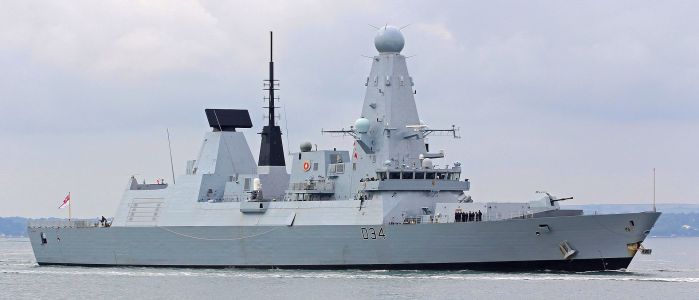
HMS Diamond
During his visit to the Middle East next week, US Defense Secretary Lloyd Austin is expected to announce the formation of Operation Prosperity Guardian, a new international effort to deal with Houthi threats, a U.S. military official told The War Zone. That information comes as U.S. and British warships shot down drones the Houthis launched in a wave from Yemen early Saturday morning local time, marking the latest escalation of attacks on shipping in the Red Sea. A French destroyer also downed a Houthis drone last week.
The Arleigh Burke-class guided-missile destroyer USS Carney downed 14 drones on Saturday, a U.S. military official told The War Zone.
The Type-45 destroyer HMS Diamond downed one drone targeting merchant shipping in the Red Sea with a Sea Viper missile, U.K. Defense Secretary Grant Shapps said in a statement. It was the first time the Royal Navy shot down an aerial target in anger since the First Gulf War in 1991 when the Type 42 Destroyer HMS Gloucester destroyed an Iraqi Silkworm missile bound for a U.S. warship.
Last week, French guided-missile frigate FS Languedoc shot down a drone with an Aster 15 missile while patrolling in the Red Sea, Naval News reported.
Similar to Task Force 153, Operation Prosperity Guardian is expected to be a larger protection force designed to provide reassurance to commercial shipping companies that Houthi attacks will be seen off, and that the sea remains safe for commercial shipping.
The Guardian reports that five big shipping companies have now stopped their ships using the Red Sea in the wake of attacks mounted by Houthis in protest at Israel’s efforts to eliminate Hamas in Gaza.
The chair of the Suez Canal Authority, Lt Gen Osama Rabie, also revealed that 55 ships have been redirected around the Cape of Good Hope, a two-week longer journey than that through the Bab al-Mandab Strait south of the Suez Canal. More than 20 ships have reported incidents in the past months, many around the narrow Bab al-Mandab that separates the Arabian peninsula from Africa.
The Hong Kong-based OOCL was the latest to announce a suspension, joining the French CMA CGM, the Danish Maersk, the German Hapag-Lloyd, and the Italian-Swiss-owned Mediterranean Shipping Co, the world’s largest shipping company.
Maersk controls 14.8% of the global shipping containers market, and the decisions, if sustained, are collectively a hammer blow to the Egyptian economy and global transport costs. The Suez Canal brought Egypt $9.5bn in 2022-23.
The US had been seeking to persuade China to join an enlarged maritime protection force being mounted out of Bahrain, but some officials believe it has secured the involvement of Jordan, the UAE, Saudi Arabia, Qatar, Oman, Egypt, and Bahrain.
Thanks to Alaric Bond and David Rye for contributing to this post.

Apropos of nothing in the article at all but rather first glance at HMS Diaomond, one wonders about sailors living on modern warships with no daylight unless conditions are pretty fair.
Hopefully bridge access is generous.
Oil transportation costs go up, = less consumption crude oil prices are fob origin, Annit
Crude oil is fob origin
$$$ up consumption down, Putin will fall out of his window
The user, the customer pays the freight
The shipper or consignor actually gets less, money for his fungible commodity crude oil..
Tsakos and other shippers enjoy more money by going around the Red Sea..
FOB indicates that the price is for the commodity loaded onto a vessel and ready for shipping. So it includes the cost of the commodity and of loading, but not the cost to deliver it to its final destination. For a FOB sale, title to the oil passes to the buyer as the oil passes the loading flange of the loading ship.